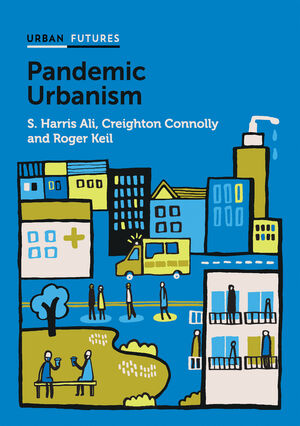Professors S. Harris Ali, of York University’s Department of Sociology, and Roger Keil, of the Faculty of Environmental and Urban Change, are co-authors, with Creighton Connolly, of Pandemic Urbanism: Infectious Diseases on a Planet of Cities (Wiley, 2023) to be featured at a sociology research presentation on Jan. 25 from noon to 2 p.m.
The event will focus on recent books and scholarly articles published by sociology professors and graduate students. Each author will host a brief discussion and Q-and-A pertaining to their work. The presentation will be delivered online, and all are welcome to attend.

Pandemic Urbanism, which the authors introduce as “a book for our urban age,” is chiefly concerned with the means through which urban living facilitates and influences the spread of disease and, crucially, how emerging diseases continue to alter urban life in turn. Through the lenses of their respective areas of expertise, Ali, Keil and Connolly – an assistant professor of urban planning and design at Hong Kong University – consider the historical, sociological and political climates that precipitate disease outbreaks, like that of COVID-19, in cities across the world.
This joint effort between Ali and Keil follows a series of projects upon which the duo has previously collaborated, including their prior book, Networked Disease: Emerging Infections in the Global City (Blackwell, 2008).
Early reviews highlight the importance of Pandemic Urbanism, which is among the first multidisciplinary explorations of the impact of COVID-19 on global urban life. Matthew Gandy, a professor of geography at Cambridge University, called the book “groundbreaking” and “of lasting significance for our understanding of the post-COVID city.”
“With a sophisticated grasp of urban theory, astute historical sensibilities, and a shrewd eye for paradoxical outcomes, the authors of this timely book show how urbanization processes have produced and been transformed by infectious disease transmission,” wrote Diane E. Davis, a professor of regional planning and urbanism at Harvard University. “There are powerful lessons for rectifying the disastrous decisions of the past by embracing new forms of city-making.”
Additional sociology research presentations include:
Reading Sociology: Decolonizing Canada (2023) by Johanne Jean-Pierre, Vanessa Watts, Carl E. James, Patrizia Albanese, Xiaobei Chen and Michael Graydon
“Introduction to Special Issue” of Comparative and International Education-Éducation comparée et internationale (2022) by Ann H. Kim, Elizabeth Buckner and Jean Michel Montsion
“South Asian and Chinese International Students in Canada: The Role of Social Connections in their Settlement and Integration” by Nancy Mandell, Janice Phonepraseuth, Jana Borras and Larry Lam appearing in Comparative and International Education-Éducation comparée et internationale (2022)
“Participatory censorship: How online fandom community facilitates authoritarian rule” by Zhifan Luo and Muyang Li appearing in New Media & Society (2023)
“Reintegrating the Feminine Voice Inherent in Sikh Scripture” by Jaspreet Bal and Santbir Singh Sarkar-Daman appearing in Journal of Feminist Studies in Religion (2021)
“Canada–AU human rights engagements: a TWAIL perspective” by Sylvia Bawa and Obiora Chinedu Okafor appearing in Canadian Journal of African Studies-Revue canadienne des études africaines (2022)


